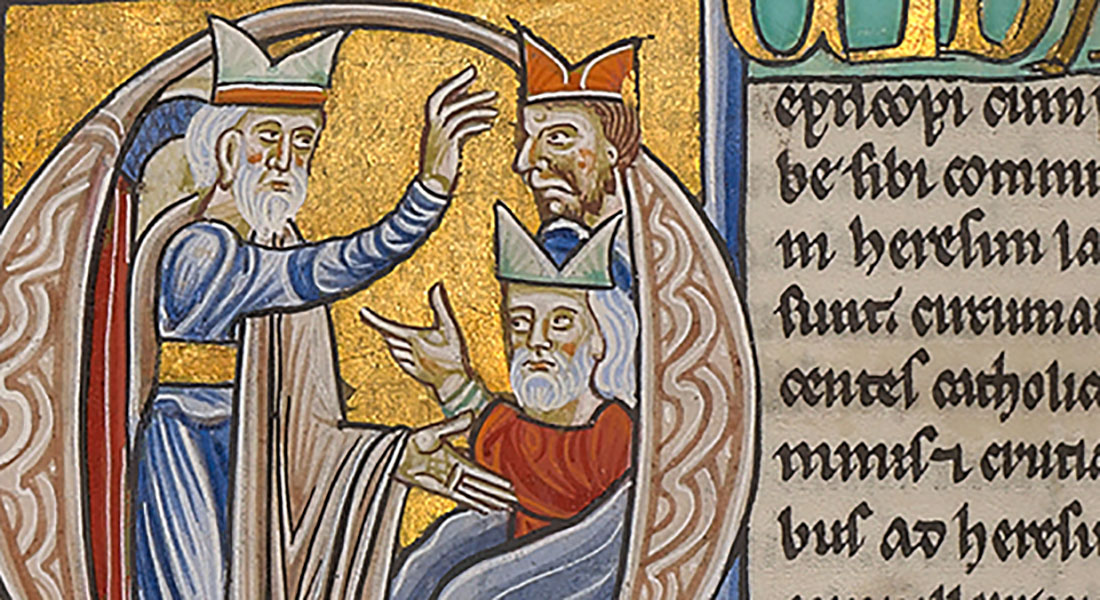Exploring Twelfth-Century Philosophy: Alberic of Paris and his School
The project provides the first large-scale investigation of the writings stemming from the milieu around the twelfth-century logician Alberic of Paris.

|
Twelfth-century Paris was the epicentre of one of the most remarkable and formative periods in intellectual history. Facilitated by a marked rise in commerce and urbanization, there was from the late-eleventh century onwards a veritable boom of scientific studies and higher education, which around the year 1200 culminated in the formation of the University of Paris. This boom has come to be known as the twelfth-century renaissance and marks, in the words of Stephen Ferruolo, the “birth (‘naissance’) of the unified, distinct, and enduring culture of Western Europe.” At the forefront of the boom were a number of philosophers who offered courses in the liberal arts (artes liberales), the forerunner of present-day humanities. Students flocked to Paris from all over Europe to attend lectures, and the masters in turn competed keenly to win scholarly fame and attract students. Particularly in the first half of the century there were a number of famous scholars who on the basis of ancient authors, such as Aristotle, Boethius and Porphyry, developed highly sophisticated positions on a number of perennial philosophical problems in the areas of logic, philosophy of language and metaphysics. Alberic of Paris was one of these philosophers. He is today, like many of them, little but a name. Well-known, by contrast, is his older contemporary Peter Abelard (1079–1142), commonly hailed as one of the greatest philosophers of the Middle Ages and one of the finest logicians of all time. And yet, we know from the Englishman John of Salisbury, who studied logic in Paris in the 1130s, that Alberic was Abelard's most formidable rival at the time and strongly opposed the metaphysical position which more than any has earned Abelard his fame: nominalism. While no texts explicitly ascribed to Alberic have survived, a number of logical treatises and philosophical commentaries that stem from his school and report his views have been preserved in various medieval Latin manuscripts. By investigating these writings, the project aims to identify, analyze and synthesize the core philosophical positions of Alberic and his school and to assess the role of this school of thought in the wider context of twelfth-century philosophy. |
Andrew Arlig (Associate professor, CUNY Brooklyn College)
Irene Binini (Marie Curie Global Fellow, University of Parma / University of Toronto)
Jeffrey E. Brower (Professor, Purdue University)
Margaret Cameron (Professor, University of Melbourne)
Laurent Cesalli (Professor, University of Geneva)
Sten Ebbesen (Emeritus professor, University of Copenhagen)
Anne Grondeux (Director of research, CNRS)
Yukio Iwakuma (Emeritus professor, Fukui Prefectural University)
Peter King (Professor, University of Toronto)
John Marenbon (Professor, University of Cambridge)
Chris Martin (Professor, University of Auckland)
Irène Rosier-Catach (Emerita director of research, CNRS/EPHE)
Caterina Tarlazzi (Rita Levi Montalcini Fellow, Ca’ Foscari / University of Notre Dame)
January 2022
The project starts
May 10–12, 2022
Enrico Donato is the respondant to John Marenbon’s (Cambridge) lectures Truth and Facts in Medieval Philosophy, at Ca’ Foscari, Venice
June 27–29, 2022
Enrico Donato and Heine Hansen present their work at the XXIII European Symposium of Medieval Logic and Semantics at the University of Warsaw
September/October 2022
The project hosts visiting professor Chris Martin (University of Auckland)
September 7, 2022
Workshop 1: Time & Other Quantities
Speakers: Jeffrey Brower (Purdue), Heine Hansen (Copenhagen)
September 15–16, 2022
Workshop 2: Realisms and Individuation in the Twelfth Century
Speakers: Laurent Cesalli (Geneva), Enrico Donato (Copenhagen), Heine Hansen (Copenhagen), Peter King (Toronto), Caterina Tarlazzi (Venice)
September 26–27, 2022
Workshop 3: Propositions in the Twelfth Century
Speakers: Enrico Donato (Copenhagen), Sten Ebbesen (Copenhagen), Heine Hansen (Copenhagen), Chris Martin (Auckland), Boaz Schuman (Copenhagen), Wojciech Wciórka (Warsaw)
October 6, 2022
Lecture: Visiting Professor Chris Martin (University of Auckland)
October 12–14, 2022
Enrico Donato, Heine Hansen, and Boaz Schuman present their work at the conference Peter Abelard’s Logic and Its Network, at Ca’ Foscari, Venice
January/March 2023
Boaz Schuman is visiting scholar at the University of Cambridge, hosted by Professor John Marenbon
February/March 2023
Enrico Donato is visiting scholar at the University of Auckland, hosted by Professor Chris Martin
May/June 2023
The project hosts visiting professor Yukio Iwakuma (Fukui Prefectural University)
May 4, 2023
Boaz Schuman presents his work at the American Philosophical Association, Pacific Division (San Francisco), with Andrew Arlig (CUNY) giving official comments
May 31, 2023
Lecture: Visiting Professor Yukio Iwakuma (Fukui Prefectural University)
June 2023
The project hosts visiting professors Chris Martin (University of Auckland) and Peter King (University of Toronto)
June 6, 2023
Workshop 4: Abelard on Porphyry: A New Edition
Speakers: Peter King (Toronto), Chris Martin (Auckland)
June 14–16, 2023
Conference: Alberic in Context
Speakers: Andrew W. Arlig (New York), Magdalena Bieniak (Warsaw), Laurent Cesalli (Geneva), Enrico Donato (Copenhagen), Sten Ebbesen (Copenhagen), Charles Girard (Geneva), Anne Grondeux (Paris), Heine Hansen (Copenhagen), Yukio Iwakuma (Fukui), Peter King (Toronto), Christopher Martin (Auckland), Sofia Orsino (Venice), Pietro Podolak (Venice), Boaz Faraday Schuman (Copenhagen), Timothy Tambassi (Venice), Caterina Tarlazzi (Venice), Paul Thom (Sydney), Luisa Valente (Rome), Wojciech Wciórka (Warsaw)
June 20–23, 2023
Heine Hansen and Boaz Schuman present their work at the Second Pan-American Symposium on the History of Logic at UCLA.
September 13–14, 2023
Workshop 5: Judging and Entertaining. A Perennial DebateSpeakers: Enrico Donato (University of Copenhagen), Peter Hanks (University of Minnesota), Irad Kimhi (University of Chicago), François Recanati (Institut Jean Nicod), Guilherme Riscali (University of Lisbon), Boaz Faraday Schuman (University of Copenhagen), Johannes Wagner (University of Cambridge)
September 20–22, 2023
Enrico Donato and Heine Hansen present their work at the conference Le filosofie del XII secolo: nuovi approcci, diverse prospettive, at Sapienza University of Rome
October 9–13, 2023
Enrico Donato, Heine Hansen, and Boaz Schuman contribute to a workshop organized by the ERC-project Polyphonic Philosophy at Ca’ Foscari, Venice
Researchers
| Name | Title | Phone | |
|---|---|---|---|
| Hansen, Heine | Associate Professor | +4551298754 |

